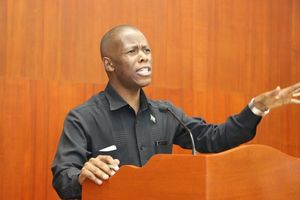A CHAT FROM LONDON: Doris Lessing - author, lover of nature, Africa and its people
What you need to know:
- Not only does she show humans, she exposes surroundings while celebrating African beauty constantly.
On Sunday it was shocking to hear the death of acclaimed English writer, 94-year-old Doris Lessing ,in London. A year younger than Nelson Mandela - both her and Madiba were fierce opponents of apartheid and injustice, albeit in different ways.
Doris Lessing came to my attention while I was still at Ilboru Secondary School, Arusha. Back then we had fantastic teachers of various nationalities. Let me give a snap shot of how things looked in 1970.
The school chaplain (or pastor) was American, Sports tutor (Canadian), Chemistry (Mr Mlay; Tanzanian), English (Mr Hopland from Norway), Literature (Mrs Chitepo - Zimbabwean), Maths, Biology and Physics (Tanzanians). English was also taught by Mr Hopson - a Briton who had a loud unforgettable voice. “Always, put a comma after however,” he boomed, “however, comma!”
But the one who introduced us to marvelous books was Mrs Victoria Chitepo, the wife of a Zimbabwean freedom fighter, Herbert Chitepo (assassinated in 1975), the first black Zimbabwean barrister, Chitepo was then President of ZANU - which rules Zimbabwe today. It is Mama Chitepo (as we affectionately called her) I should praise her here.
We boys (in her class) were made to enjoy words, literature and wonderful authors. She was clear, vibrant, and strict.
I first heard of the book The Grass is Singing through her. Ironically at the time, the Doris Lessing novel was topical because it was based in Zimbabwe (then called South Rhodesia) - under Ian Smith - a constant subject equivalent to today’s Afghanistan and Congo’s M23.
When I read it (aged 16) – as most novels would be found in the school library – I understood the story (language was not the problem), yet the deeper meaning was beyond me. You needed teachers like Mrs Chitepo and Mr Hopland to guide you. Is this guidance available in our Tanzanian schools, today?
Doris Lessing tells a simple tale of a black man who kills his white female boss. Those days male domestic helps were “ boys” – a word that was transported into Kiswahili (boi wa Mzungu, boi wa Mhindi, boi wa bwana mkubwa, etc).
In Grass is Singing, published in 1950 – the height of colonial rule – there are slow, intense movements in this Zimbabwe farm. Lessing is quite observant. “The pale sandy soil, in front of the house dazzled up the rays of light, and out of it curved the gleaming stems of the poinsettia bushes, bursting into irregular slashes of crimson.”
Poinsettias are plenty across Eastern African highlands too – Lushoto, Nakuru, Kilimanjaro, Busoga, Mbeya etc. They have deep red, wide flowers and broad green leaves. Lessing uses the word “crimson” which is like blood. During colonial times we called poinsettias “maua ya Kizungu” – they are very beautiful and pretty and those days, anything splendid was, supposedly, European or foreign.
Has such perceptions changed?
Lessing’s description of colours in African landscapes and detailed vegetation was therefore, prominent in all her books. Her geographical dramatisation expressed her love for the continent.
In A Proper Marriage (1964) – also based in Southern Africa, human tension is combined with excellent description of the environment. “A single tree stood at the entrance; and on this soft green patch their eyes rested in relief from the staring white, the glistening grey, the hard, brilliant blue of the sky. Under the tree stood a native woman.
“She held a small child by one hand and a slightly larger one by the other, and there was a new baby folded in a loop of cloth on her back. The other children held the stuff of her skirt from behind…”
The London-based author loved people. Note the portrayal of racist colonial thoughts in “The Grass is Singing”:
“The man slouched and stooped in the sunshine, resenting her presence; the native women stared and laughed; the filthy underfed children crowded around, whispering to each other, the starved dogs slunk in the background among the vines and the mealies. She hated the place. “Filthy savages!” she thought vindictively.”
Lessing wrote over fifty books and won the Nobel Prize for Literature aged 88, in 2007 – which is old – the eleventh woman to nail it. She has been praised for pioneering work (so said the Nobel Prize Committee) in depicting feelings of women (Golden Notebook, 1962- considered a masterpiece) and exploring new ways of story telling. She boldly stood up against apartheid and racism.
Why shouldn’t we pay more attention to her work? Few pre-colonial and post – colonial authors loved Africa this much. Reading Lessing’s books, is significant in improving the student’s language and those using English to work and study.
Mrs Chitepo, our teacher, was right as so many former Ilboru schoolmates who have become lecturers, government officials and journalists, would certainly agree.



